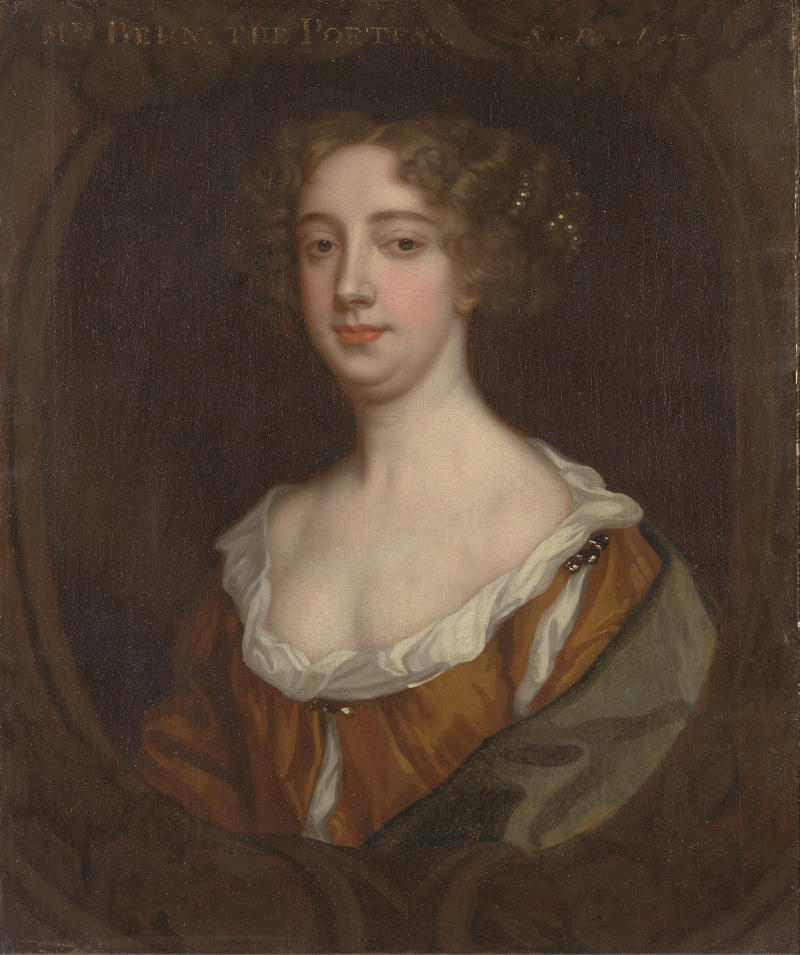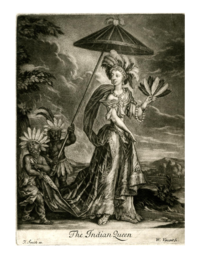The Widow Ranter by Aphra Behn

"Aphra Behn," by the Anglo-Dutch artist Sir Peter Lely, oil on canvas, ca. 1670.
Yale Center for British Art, Yale University, New Haven, Connecticut, via Wikimedia Commons.
Aphra Behn’s last play, The Widow Ranter, is the first stage representation of an English colony in North America … and it is not a flattering depiction! Populated by criminals, drunkards, and cowards, Behn presents the colony at Jamestown, Virginia as a failing society which, crucially, is far less civilised than the Native American tribe they have displaced.
Based on the actual historical events of Bacon’s Rebellion (1676) in which the merchant adventurer Nathaniel Bacon attacked Jamestown’s Native American allies against the Governor’s orders, Behn’s theatrical adaptation of the story invents a romance between Bacon and the “Indian” Queen Semernia. Consequently, in Behn’s play one of Bacon’s motivations for fighting the local tribe is to kill Semernia’s husband, Cavarnio, and marry her himself. In this scene, Semernia disguises herself as a boy to escape Bacon’s clutches.

Mezzotint Portrait of Anne Bracegirdle, dressed as the 'Indian Queen', by John Smith (after William Vincent) (c.1690s)
© The Trustees of the British Museum. (CC BY-NC-SA 4.0 licence).
Semernia’s feelings towards Bacon are complicated. Semernia has been in love with Bacon since she was twelve years old, but believes that her love for her “conqueror” and the “murderer” of her husband compromises her “honour.” It is only after Bacon mortally wounds Semernia (thinking that she is a man) that she finally confesses her love to him. Behn therefore subverts the common seventeenth-century portrayal of “Indian” queens being tamed through their marriage to white Europeans and conversion to Christianity, a narrative made popular by the highly fictionalised account of Pocahontas’ ‘love affairs’ with the Englishmen John Smith and John Rolfe. Behn instead suggests that this is an unrealistic portrayal of the relationship between coloniser and colonised. After all, the historical Pocahontas’ conversion and marriage to Rolfe occurred whilst she was held as a hostage! That Bacon continues to refer to Semernia as his “prize” after her death suggests that he thinks of her more as an object he can win, than as a woman he loves.
But Behn’s portrayal of Semernia and Bacon’s ‘relationship’ – and, indeed, the entire colonial project – is not wholly negative. Critics have long disagreed over whether we are supposed to sympathise with Bacon, while the rise of the charismatic Widow Ranter (the titular character) from indentured servant to wealthy pillar of the community implies that colonialism rewards enterprising (white) women. Perhaps most problematically for modern readers, Semernia was originally played by the white actress Anne Bracegirdle (pictured here) in a costume made from items imported from England's colonies!
Nevertheless, The Widow Ranter stands out as a depiction of colonialism focused on the female experience. While Caliban in Shakespeare’s The Tempest complains that Prospero beats him and has disinherited him, the queen’s maid Anaria suggests that women face far worse treatment, fearing that Bacon will conquer Semernia’s body by “force,” just as he has conquered her kingdom. Written by the first professional female writer in English (whose statue is due to be unveiled in 2024) Aphra Behn’s The Widow Ranter offers a proto-feminist interpretation of colonialism, in which women become representative of the plundered land they inhabit.
—Caroline Taylor
The Widow Ranter
A thick wood.
Enter Queen dress’d like an Indian Man, with a Bow in her Hand, and Quiver at her Back; Anaria her Confidant disguis’d so too; and about a dozen Indians led by Cavaro.
Queen. I tremble yet, dost think we’re safe, Cavaro?
Cav. Madam, these Woods are intricate and vast, and ’twill be difficult to find us out—or if they do, this Habit will secure you from the fear of being taken.
Queen. Dost think if Bacon find us, he will not know me? Alas, my Fears and Blushes will betray me.
Ana. ’Tis certain, Madam, if we stay we perish; for all the Wood’s surrounded by the Conqueror.
Queen. Alas, ’tis better we should perish here, than stay to expect the Violence of his Passion, to which my Heart’s too sensibly inclin’d.
Ana. Why do you not obey its Dictates then? why do you fly the Conqueror?
Queen. Not fly—not fly the Murderer of my Lord?
Ana. What World, what Resolution can preserve you? and what he cannot gain by soft submission, Force will at last o’ercome.
Queen. I wish there were in Nature one excuse, either by Force or Reason to compel me:—For Oh, Anaria—I adore this General;—take from my Soul a Truth—till now conceal’d—at twelve Years old—at the Pauwomungian Court, I saw this Conqueror. I saw him young and gay as new-born Spring, glorious and charming as the Mid-day’s Sun; I watch’d his Looks, and listned when he spoke, and thought him more than mortal.
Ana. He has a graceful Form.
Queen. At last a fatal Match concluded was between my Lord and me; I gave my Hand, but oh, how far my Heart was from consenting, the angry Gods are Witness.
Ana. ’Twas pity.
Queen. Twelve tedious Moons I pass’d in silent Languishment; Honour endeavouring to destroy my Love, but all in vain; for still my Pain return’d whenever I beheld my Conqueror; but now when I consider him as Murderer of my Lord— Fiercely. I sigh and wish—some other fatal Hand had given him his Death.—But now there’s a necessity, I must be brave and overcome my Heart; What if I do? ah, whither shall I fly? I have no Amazonian Fire about me, all my Artillery is Sighs and Tears, the Earth my Bed, and Heaven my Canopy.
Weeps. After, Noise of Fighting.
Hah, we are surpriz’d; Oh, whither shall I fly? And yet methinks a certain trembling Joy, spite of my Soul, spite of my boasted Honour, runs shivering round my Heart.
Enter an Indian.
Ind. Madam, your Out-guards are surpriz’d by Bacon, who hews down all before him, and demands the Queen with such a Voice, and Eyes so fierce and angry, he kills us with his Looks.
Cav. Draw up your poison’d Arrows to the head, and aim them at his Heart, sure some will hit.
Queen. Cruel Cavaro,—wou’d ’twere fit for me to contradict thy Justice. Aside.
Bac. Within. The Queen, ye Slaves, give me the Queen, and live!
He enters furiously, beating back some Indians; Cavaro’s Party going to shoot, the Queen runs in.
Queen. Hold, hold, I do command ye.
Bacon flies on ’em as they shoot and miss him, fights like a Fury, and wounds the Queen in the Disorder; beats them all out.
—hold thy commanding Hand, and do not kill me, who wou’d not hurt thee to regain my Kingdom—
He snatches her in his Arms, she reels.
Bac. Hah—a Woman’s Voice,—what art thou? Oh my Fears!
Queen. Thy Hand has been too cruel to a Heart—whose Crime was only tender Thoughts for thee.
Bac. The Queen! What is’t my sacrilegious Hand has done!
Queen. The noblest Office of a gallant Friend, thou’st sav’d my Honour, and hast given me Death.
Bac. Is’t possible! ye unregarding Gods, is’t possible?
Queen. Now I may love you without Infamy, and please my dying Heart by gazing on you.
Bac. Oh, I am lost—for ever lost—I find my Brain turn with the wild confusion.
Queen. I faint—oh, lay me gently on the Earth. Lays her down.
Bac. Who waits— Turns in Rage to his Men.
Make of the Trophies of the War a Pile, and set it all on fire, that I may leap into consuming Flames—while all my Tents are burning round about me. Wildly.
Oh thou dear Prize, for which alone I toil’d!
Weeps, and lies down by her.
Enter Fearless with his Sword drawn.
Fear. Hah, on the Earth—how do you, Sir?
Bac. What wou’dst thou?
Fear. Wellman with all the Forces he can gather, attacks us even in our very Camp; assist us, Sir, or all is lost.
Bac. Why, prithee let him make the World his Prize, I have no business with the Trifle now; it contains nothing that’s worth my care, since my fair Queen—is dead—and by my hand.
Queen. So charming and obliging is thy Moan, that I cou’d wish for Life to recompense it; but oh, Death falls—all cold upon my Heart, like Mildews on the Blossoms.
Fear. By Heaven, Sir, this Love will ruin all—rise, rise, and save us yet.
Bac. Leave me, what e’er becomes of me—lose not thy share of Glory—prithee leave me.
Queen. Alas, I fear thy Fate is drawing on, and I shall shortly meet thee in the Clouds; till then—farewel—even Death is pleasing to me, while thus—I find it in thy Arms— Dies.
Bac. There ends my Race of Glory and of Life.
An Alarm at distance—continues a while.
Hah—Why should I idly whine away my Life, since there are nobler ways to meet with Death? Up, up, and face him then—Hark—there’s the Soldier’s Knell—and all the Joys of Life—with thee I bid farewel— Goes out.
The Indians bear off the Body of the Queen
Some themes and questions to consider
-
Think about the different vocabularies Semernia and Bacon use to describe each other. What do they suggest about their feelings?
-
Look at the stage directions. Do they affect the poignancy of this scene? How would you stage it?
-
Why does Behn show Semernia and Anaria debate giving themselves up to Bacon? Is one argument more convincing than the other?
-
How does this extract compare to other colonial narratives you have encountered?
The full text of The Widow Ranter is available on Project Gutenberg.
A Is for Aphra
Find out more about Aphra Behn, and the campaign to increase public interest in her work.
British Library Aphra Behn Pages
Discover more about Behn, and how her works were used in the eighteenth-century abolitionist movement.
TIDE Resources for Teachers
View a number of primary sources exploring race in Tudor and Stuart England.
“Indian”, in Keywords of Identity, Race and Human Mobility in Early Modern England
What did it mean to be “Indian” in the seventeenth-century English imagination?
Heidi Hutner, Colonial Women: Race and Culture in Stuart Drama
In this fascinating book, Hutner looks at a variety of colonial female characters in seventeenth-century drama. Her chapter on The Widow Ranter looks at how Behn’s Semernia intersects with popular tales about Pocahontas and the seventeenth-century fantasy of ‘civilising’ colonised peoples.
Bacon's Rebellion (1676-1677)
Find out more about the historical events which inspired Behn’s play.
About the Contributor
Caroline Taylor is a third-year doctoral student in English at St Hugh’s College, Oxford. Her research interests are early modern and Restoration theatre, with a specific focus on the intersection of plague and women on the English stage during the ‘long seventeenth century’. She is particularly interested in practice-based research and public engagement. She is a participant in the Jesus College Shakespeare Project, a contributor to the stand-up show History Showoff, and can be heard talking about modern interpretations of Restoration drama on the Reimagining Performance podcast ‘Post-Show Conversations’.




